[App Fridays] After seeing 300 percent growth, Gaana bets on ‘Social’ for stickiness and more growth
In a post-Jio world, users are now streaming music on the go, more freely. But how does one keep them engaged? Gaana is betting big on a social integration to take their ‘musical graph’ forward.
When Steve Jobs (and Apple) launched the iPod in 2001, the marketing pitch was ‘1,000 songs in your pocket’. Sixteen year later, video and music streaming services are able to provide users access to millions of videos and audio content on the go. The marketing pitch now is, ‘Million of songs and videos in your pocket, on the cloud’.
In India, until recently, the high cost of mobile internet data meant that consumers had to generally restrict streaming to when they were in Wi-Fi zones. But over the past year, the arrival of Reliance Jio and consolidation in the telecom sector has brought about a big change in consumer behaviour by drastically driving down the cost of internet data plans. While Spotify and Apple Music have been leading the charge globally, Saavn, Gaana and JioMusic are popular music streaming players in India.
Gaana recently launched a new feature, Gaana Social that lets users experience music in a more social environment. In this week’s App Friday, we explore Gaana Social and try to better understand the Indian music streaming landscape.
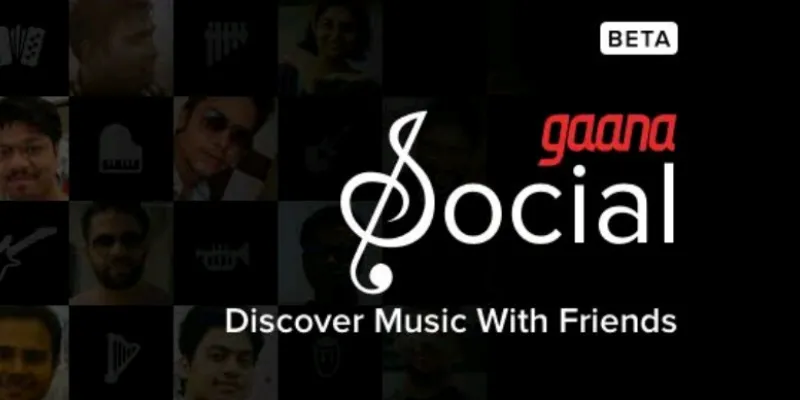
Gaana Social
Headquartered in New Delhi, India, Gaana provides music streaming across mobile apps and web browsers. In October 2015, the company had raised an undisclosed amount from Micromax Informatics. Gaana’s focus is on music across artists and genres ranging from Bollywood and regional music to radio streaming.
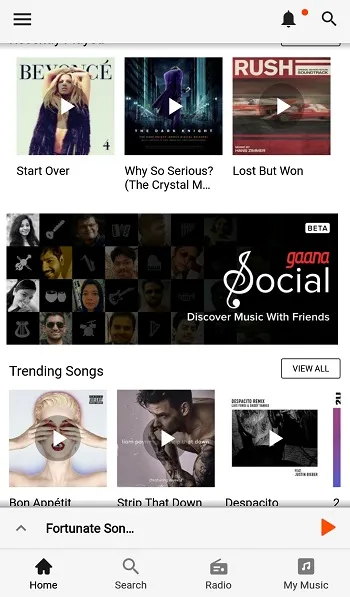
Gaana recently introduced a new feature Gaana Social, that lets users share music with their families, friends and followers. In a recent telephonic interaction with YourStory, Prashan Agarwal, COO, Gaana, and Rohit Raghav, Product Head at Gaana, explained that Gaana Social aims to build a socio-musical community by enabling users to connect with existing friends, build music interest-based social relationships, and discover great music in their daily feed.
Gaana considers itself the first in the Indian market to build a ‘musical graph’ by integrating music and social on a large scale. Prashan Agarwal, COO, Gaana.com, said
We spent a lot of time in understanding how our users listen to music and found that they had a deep emotional desire to share their music with their friends and family in a seamless experience. Gaana Social does just that for its users by developing deeper social connections and creating content virality.
How Gaana Social Works
Users logged in through Facebook will automatically get connected to their Facebook friends who use Gaana. Gaana Social uses the ‘follower’ intergration and users can grow their network by discovering and following more people through the discovery points within the app. Users can also control their privacy settings based on their requirements to customise the aspects of their music consuming experience which they wish to share with their followers.
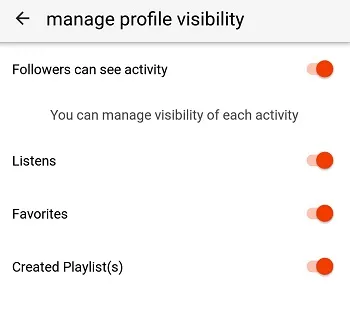
The Gaana Social feed can be accessed through a card on the app’s home screen. However, it doesn’t seem to be available on the web version of Gaana. Through Social users can:
- View and engage with friends’ music history -- what they listened to, liked, created, and shared (based on their privacy setting).
- Share music and self-curated playlists with friends.
- Listen to popular music based on your location and network.
- Discover the best of Gaana: enjoy music curated by editors and the Gaana network -- all personalised for you.
According to the Gaana team, the recommendations get smarter and richer with protracted usage. For the purpose of this review, I played around with Gaana Social for over a week to better understand the experience and its features. Most of the features mentioned work as described. For example, I found that my account was private by default and could tweak my visibility as desired.
The recommendations under You May Like got more personalised over the week as I explored the platform. Checking out tracks that friends were listening was also an interesting experience. But given that the feature is relatively new, network effects are yet to kick in. My friend circle on Gaana is currently in double digits and it will probably take some time for it to become a habit among other non-early adopters.
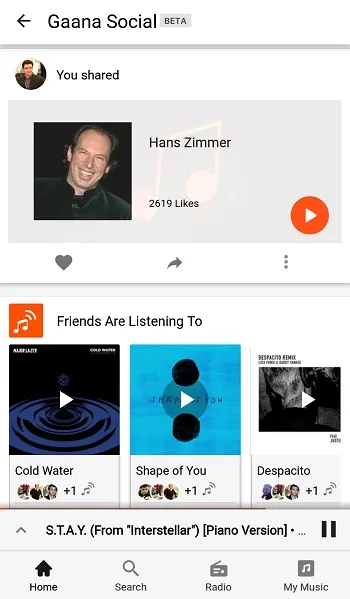
Facebook has a ‘listening to’ feature and encourages users to share their tracks on the platform. So Gaana will probably need to integrate more social features for better stickiness. For example, it could let users who mutually follow each other recommend tracks that they think their friends may like. This could be done over a private chat or public forum and users could engage in a conversation around the track.
On the whole, Gaana Social is a step forward and the timing is also great, as more users are now actively listening to music on the go, thanks to affordable mobile data plans.
Related read: [App Fridays] Pindrop Music lets your mood and location decide your next track
Sector overview and future plans
According to the IFPL Global Music Report 2017, in 2016 the global recorded music market grew 5.9 percent, the fastest since IFPI began tracking the market in 1997. This was the second consecutive year of global growth for the industry, with revenue increasing in the majority of markets, including nine of the top ten.
While there are other avenues for revenue generation, IFPI notes that music streaming was the clear driver of this growth, with revenues surging by 60.4 percent. With more than 100 million users of paid subscriptions globally, streaming has passed a crucial milestone. It makes up the majority of the digital revenue, which, in turn, now accounts for 50 percent of the total recorded music revenues.
Closer home in India, music streaming seems to have grown exponentially in recent times. According to the 2017 KPCB Internet Trends Report by Mary Meeker, Gaana’s witnessed 300 percent growth in the last nine months of the 2017-17 fiscal.
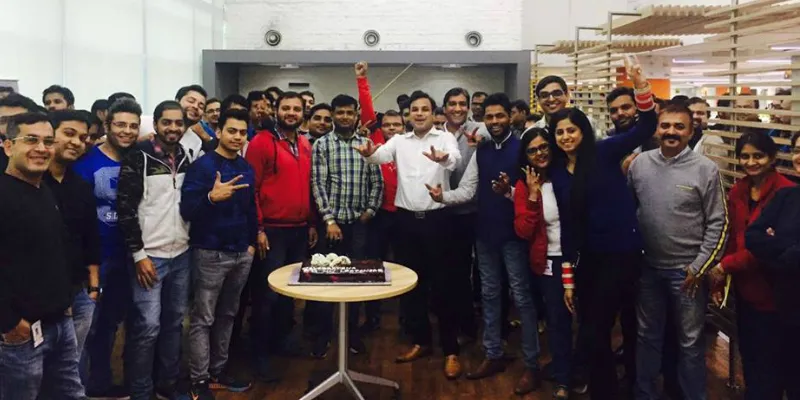
Some of the other players focused on the social experience in India include Bengaluru-based Lisn, which let users stream music with friends in real time, without sharing earphones. Then there is Pindrop Music, a Guragon-based startup that lets a user’s mood and location decide their next track. On the global front, there are players like Moodfuse, Meemix and others that are looking to cash in on the inevitable need for personalisation in the music streaming space.
Some of Gaana’s other integrations from 2016 include a Facebook messenger bot, Android Auto, Amazon Fire TV & Chromecast. In 2017, the Gaana team shared that they are working on a voice search and play feature for its Android users to deliver a better experience and eliminate typing errors. Gaana also notes that future iterations will let users follow Gaana Editors for expert recommendations, request friends for playlists and also create playlists with friends.
Disclaimer- For the pupose of this review, Gaana gave YourStory access to a Gaana Plus account to explore all the features.
Website- Gaana
Related read: [App Fridays]Can AI-powered summaries, timelines improve newsreading experience? Tenreads believes so


![[App Fridays] After seeing 300 percent growth, Gaana bets on ‘Social’ for stickiness and more growth](https://images.yourstory.com/cs/wordpress/2017/07/gaana-7.jpg?mode=crop&crop=faces&ar=2%3A1&format=auto&w=1920&q=75)




